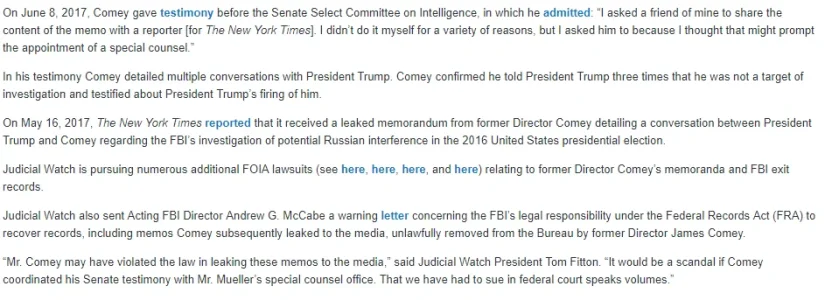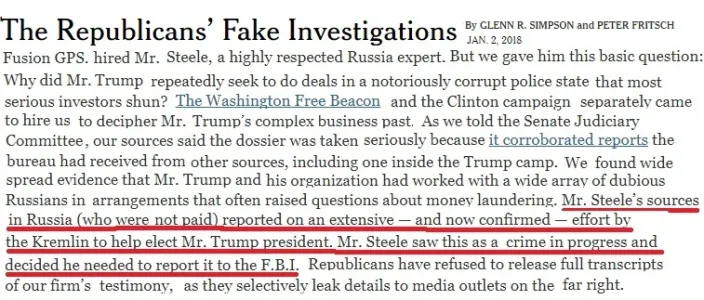The investigation into collusion of Trump and Russia seems to be BS all the way. It's taken far longer than it should. It also seems to be tainted badly with bias on many levels. Even so I've said let it play out. However enough time has passed to where I think its become clear its being done solely not on any laws that have potentially been broken but for political gain in 2018.
Wrong and wrong....again.
Also...if there Russia is a “nothing-burger” then why are people pleading fucking guilty of dirty dealings with Russians and others?
Makes no sense....you have your horse-blinders on.
_______________________________________________________________________________________________________
"Critics have been quick to compare the controversy surrounding the White House and Russia to the Watergate scandal that forced President Richard Nixon to resign. But the Watergate drama took longer to unfold — more than two years — than many people may remember. Here’s a quick refresher of the events that led to Nixon’s resignation, along with a reminder that despite the recent pace of news in Washington, political crises are often slow-burning affairs.
June 17, 1972
Five men are arrested while trying to bug the Democratic National Committee’s headquarters at the Watergate, a hotel and office building in Washington, D.C. A day later, White House press secretary Ronald Ziegler famously called the Watergate break-in a “third-rate burglary.” At a press conference June 22, President Nixon denied that the White House was involved in the incident.
Aug. 1, 1972
The Washington Post reported that a $25,000 check intended for Nixon’s 1972 reelection campaign was deposited in the bank account of one of the Watergate burglars. It was one of the first developments linking the DNC break-in to Nixon’s campaign.
Oct. 10, 1972
The Post reports the FBI had concluded the Watergate break-in was part of a broader spying effort connected to Nixon’s campaign. News of the FBI’s findings came two weeks after the Post reported that former Attorney General John Mitchell, who stepped down earlier that year, had controlled a secret fund that paid for spying on the Democratic Party.
Jan. 8, 1973
The trial for the Watergate break-in begins.
Jan. 30, 1973
G. Gordon Liddy, a former Nixon aide, and James McCord, a one-time Nixon aide and former CIA operative, are convicted for their role in spearheading the Watergate break-in.
April 30, 1973
The scandal reaches the White House, as senior White House aides H.R. Haldeman and John Ehrlichman resign over Watergate. Attorney General Richard Kleindienst also resigns, and John Dean, the White House counsel, gets fired.
May 18, 1973
Attorney General Elliot Richardson appoints Archibald Cox as special prosecutor to lead the investigation into Nixon’s reelection campaign and Watergate. Cox was a respected attorney and law professor, and had served as the United States solicitor general under Presidents John F. Kennedy and Lyndon Johnson.
READ MORE: The ‘special prosecutor’ Democrats want no longer exists
Cox’s appointment comes one day after the Senate Watergate Committee begins its public hearings on the scandal. The committee’s hearings are nationally televised and, along with Cox’s investigation, marke a new phase in the Watergate scandal. It is at these Senate hearings that then-Sen. Howard Baker, R-Tenn., asks one of the most famous questions in American politics: “What did the president know, and when did he know it?”
July 23, 1973
Nixon,
who taped his conversations and calls in office, refuses to give Cox and Senate Watergate investigators the recordings, which became known as the “Nixon tapes.” The tapes were believed to contain critical evidence of a cover-up of Nixon’s involvement in the break-in; the previous month, Dean, the former White House counsel, acknowledged that he had talked with Nixon about the Watergate matter dozens of times. After Nixon refused to turn the tapes over, both Cox and Senate investigators issue subpoenas for the material.
Oct. 20, 1973
The day that becomes known as the “Saturday Night Massacre.” Attorney General Richardson and Deputy Attorney General William Ruckelshaus resign in the same night after refusing Nixon’s order to fire Cox. Robert Bork, the solicitor general who was acting as attorney general, then followed Nixon’s order and fired Cox. Nixon’s push to oust Cox, who was leading the independent investigation into the White House misconduct, sparked intense criticism across the political spectrum. Four weeks later, on Nov. 17, Nixon issued his memorable denial: “I’m not a crook.”
May 9, 1974
The House Judiciary Committee starts impeachment proceedings against Nixon.
July 24, 1974
In a unanimous ruling, the Supreme Court orders Nixon to release the tape recordings. The decision came two months after the White House gave the House Judiciary Committee edited transcripts of Nixon’s conversations, but did not turn over the actual tapes.
July 27-30, 1974
The House Judiciary Committee passes three articles of impeachment against Nixon, for obstruction of justice, misuse of power and contempt of Congress. By approving the charges, the committee sent the impeachment to the floor for a full House vote, but it never occurred.
Aug. 8, 1974
Nixon resigns. In his
resignation speech, Nixon said: “I have never been a quitter. To leave office before my term is completed is abhorrent to every instinct in my body. But as president, I must put the interest of America first.”


